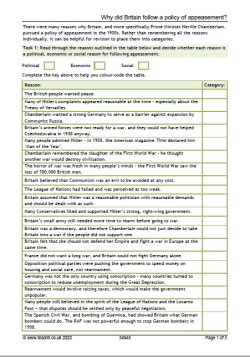Why did Britain follow a policy of appeasement?

A GCSE resource for the AQA wider world depth study Conflict and tension: The inter-war years, 1918–1939.
Students consider a list of reasons why Britain in general, and Neville Chamberlain in particular, pursued a policy of appeasement in the 1930s and colour-code them as economic reasons, political reasons or social reasons.
They then rank the three factors in order of significance and explain their ranking.
Finally, they plan an answer to the exam-style question: 'Neville Chamberlain pursued a policy of appeasement for mainly economic reasons.' Discuss.
An extract from the categorising task:
|
The horror of war was fresh in many people’s minds – the First World War saw the loss of 700,000 British men. |
|
Britain believed that Communism was an evil to be avoided at any cost. |
|
The League of Nations had failed and was perceived as too weak. |
